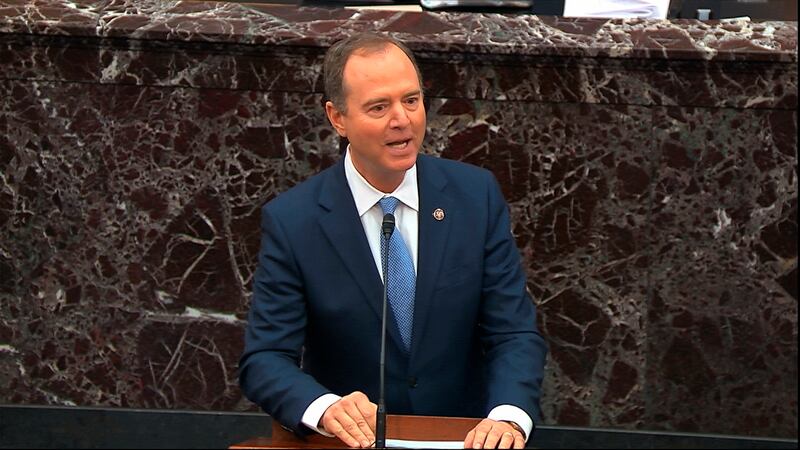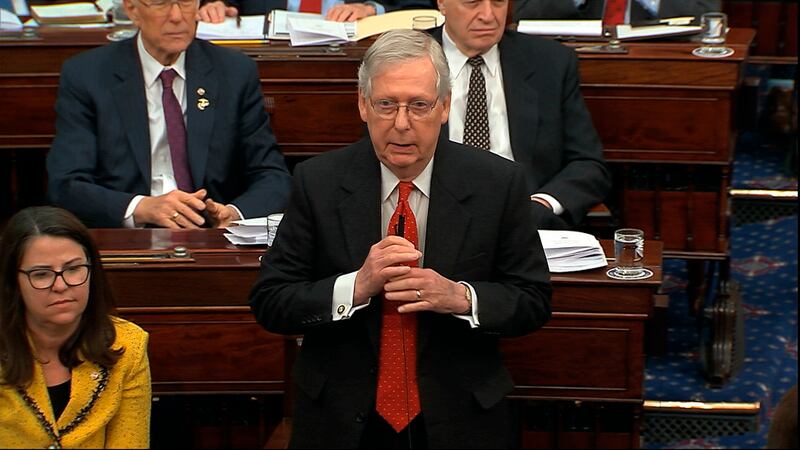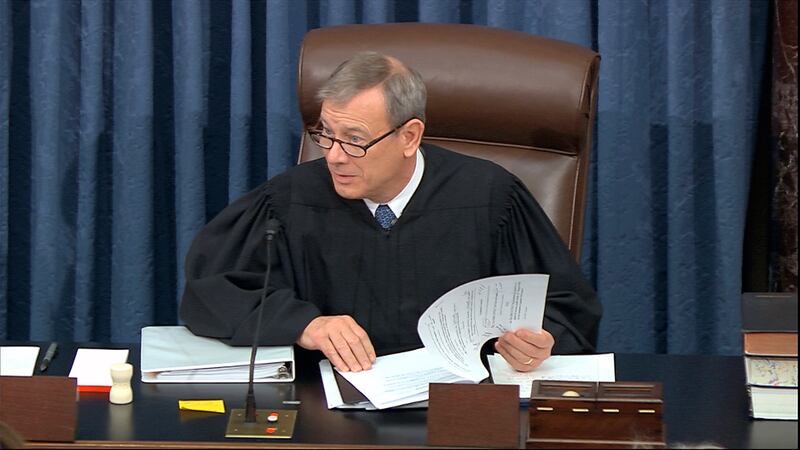Update: The session of President Donald Trump’s impeachment trial that began Tuesday ended near 2 a.m. Eastern time on Wednesday with Republicans easily approving the new trial rules largely on their terms.
WASHINGTON — The solemn unity that characterized the ceremonial beginnings of the Senate impeachment trial of President Donald Trump quickly dissolved into a fiercely partisan debate Tuesday on rules governing the historic proceeding that resumes Wednesday with possible opening arguments.
In a series of party-line votes Tuesday, senators killed repeated attempts by Democrats to subpoena documents and call new witnesses at the beginning of the trial.
Utah Republican Sens. Mike Lee and Mitt Romney said before Tuesday they support the rules, which are modeled after the 1999 impeachment trial of President Bill Clinton. Romney, who Democrats hope will vote to hear from additional witnesses later in the trial, expected the attempts to amend but advised Democrats to pick their battles, referring to other complaints about how the rules deviated from the Clinton model.
“If you call everything outrageous, then nothing becomes outrageous,” Romney told reporters before the trial Tuesday.
But California Congressman Adam Schiff, heading up a team of Democrat House managers prosecuting the case, in a forceful speech to senators raised the stakes of approving rules that won’t allow for subpoenaing witnesses or documents until after the opening arguments.

He said the senators’ most important vote won’t be when they find the president either guilty or not guilty at the end of the trial.
“I believe the most important decision you will make in this case is the one you will make today,” Schiff said. “The question you must answer today is, will the president and the American people get a fair trial?”
Senators, who are not allowed to speak during the proceedings, sat silently listening as prosecutors and Trump’s defense team passionately presented their cases in speeches that at times devolved into personal attacks in the televised proceedings.
Some senators sat with hands folded or leaned back with crossed legs during the hourlong session, while others took notes. But no one was as dedicated to writing as Lee, who took copious notes throughout the marathon session. Senators surrendered their cell phones, laptops and other electronics at the door of the chamber.
While they were debating rules, attorneys for both sides took the opportunity to add details of the case against the president and the defense that Trump is a victim of Democrats intent on nullifying the results of his 2016 victory and get him off the ballot in November.
“They don’t have the guts to say it directly but that’s exactly what they are here to do,” White House Counsel Pat Cipollone boomed. “I could go on and on, but my point is very simple: It’s long past time we stop this charade and go have an election.”
House Democrats passed two articles of impeachment in December charging Trump with abuse of power in pressuring Ukraine to investigate political rival Joe Biden while withholding military aid, and obstruction of Congress for defying requests for testimony and documents during the ensuing House investigation.
Schiff argued that senators should decide on witnesses and documents now rather than later if they wanted to give both Trump and the “American people” a fair trial.
“Most Americans believe there won’t be a fair trial. They won’t believe the Senate will be impartial. They believe that the result is pre-cooked,” Schiff said, referring to predictions that the GOP-controlled Senate will acquit Trump. “Let’s prove them wrong ... by letting the House prove its case.”
But the president’s defense team blasted the House case, calling it weak and saying the House refused to go through the courts when Trump invoked executive privilege on requests for witnesses and documents.
“And then they come here and they ask you to do the work that they refuse to do for themselves,” Cipollone said. “It’s ridiculous and we should call it out for what it is.”
Although the rules will likely survive on a party-line vote, McConnell did change them shortly before the trial resumed in the wake of complaints from senators both Democrat and Republican.
He relaxed the time for opening arguments from two days to three days and, more significantly, allowed the House impeachment proceedings to be entered as evidence after opening arguments and after both sides have a chance to strike or add evidence.

News reports said McConnell’s handwritten changes came after a private GOP lunch, where concerns were raised that the tight time frame that could force the trial to occur in the late hours of the night could give Democrats ammunition to say Republicans are trying to keep the spectacle from public viewers.
Lee, in an interview with KSL NewsRadio, said 24 hours of argument should be plenty of time for either side to present its case. “They didn’t use anywhere near that amount of time in the Clinton impeachment trial,” he said.
Still, the Associated Press noted that the last minute change “was a swift lesson as White House’s wishes run into the reality of the Senate. The White House wanted a session crammed into a shorter period to both expedite the trial and shift more of the proceedings into late night, according to a person familiar with the matter but unauthorized to discuss it in public.”
The debate, however, over whether to call witnesses didn’t die Tuesday. Minority Leader Chuck Schumer, D-N.Y., said he would introduce his requests to subpoena witnesses and documents following opening arguments and questions from senators.
And its not known if Senate Majority Leader Mitch McConnell, R-Ky,, can keep his majority together that long. It would take just four GOP senators to break ranks and provide the 51 votes needed to open the trial to new witnesses and evidence.
Lee said he doesn’t expect to hear anything that would convince him to call for more evidence. But Romney is among at least three Republican senators who lobbied for the opportunity to hear from additional witnesses following opening arguments.
Opening arguments are scheduled into early next week, followed by a 16-hour period for senators to ask questions. That will be followed by four hours of debate. Only then would there be votes on calling other witnesses and new evidence.
At the end of deliberations, the Senate would then vote on each impeachment article.


